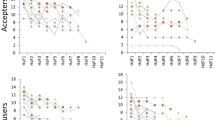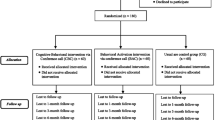Abstract
This clinical trial tested whether telephone-administered supportive-expressive group therapy or coping effectiveness training reduce depressive symptoms in HIV-infected older adults. Participants from 24 states (N = 361) completed the Geriatric Depression Scale at pre-intervention, post-intervention, and 4- and 8-month follow-up and were randomized to one of three study arms: (1) 12 weekly sessions of telephone-administered, supportive-expressive group therapy (tele-SEGT; n = 122); (2) 12 weekly sessions of telephone-administered, coping effectiveness training (tele-CET; n = 118); or (3) a standard of care (SOC) control group (n = 121). Tele-SEGT participants reported fewer depressive symptoms than SOC controls at post-intervention (MSEGT = 11.9, MSOC = 14.3) and 4- (MSEGT = 12.5, MSOC = 14.4) and 8-month follow-up (MSEGT = 12.7, MSOC = 14.5) and fewer depressive symptoms than tele-CET participants at post-intervention (MSEGT = 12.4, MCET = 13.6) and 8-month follow-up (MSEGT = 12.7, MCET = 14.1). Tele-CET participants reported no statistically significant differences from SOC controls in GDS values at any assessment period. Tele-SEGT constitutes an efficacious treatment to reduce depressive symptoms in HIV-infected older adults.

Similar content being viewed by others

Abbreviations
- AIDS:
-
Acquired immunodeficiency syndrome
- ANOVA:
-
Analysis of variance
- ASOs:
-
AIDS service organizations
- CET:
-
Coping effectiveness training
- GDS:
-
Geriatric depression scale
- GEE:
-
Generalized estimating equations
- FU:
-
Follow-up
- HAART:
-
Highly active antiretroviral therapy
- HIV:
-
Human immunodeficiency virus
- IRB:
-
Institutional review board
- MSM:
-
Men who have sex with men
- PTSD:
-
Post-traumatic stress disorder
- RCT:
-
Randomized clinical trial
- SEGT:
-
Supportive-expressive group therapy
- SOC:
-
Standard of care
References
Centers for Disease Control and Prevention. HIV Surveillance Report. 2010. http://www.cdc.gov/hiv/topics/surveillance/resources/reports/. Accessed 23 Aug 2012.
Centers for Disease Control and Prevention. HIV Surveillance Report. 2010. http://www.cdc.gov/hiv/topics/surveillance/resources/reports/. Accessed 2 Jan 2013.
Lovejoy TI, Heckman TG, Sikkema KJ, et al. Patterns and correlates of sexual activity and condom use behavior in persons 50-plus years of age living with HIV/AIDS. AIDS Behav. 2008;12:943–56.
Palelle FJ, Baker RK, Moorman AC, et al. Mortality in the highly active antiretroviral therapy era: changing causes of death and disease in the HIV outpatient study. J Acquir Immune Defic Syndr. 2006;43:27–34.
Justice A. HIV and Aging: time for a new paradigm. Curr HIV/AIDS Rep. 2010;7:69–76.
Centers for Disease Control and Prevention. HIV Surveillance Report. 2010. http://www.cdc.gov/hiv/yopics/surveillance/reources/reorts/. Accessed 14 Dec 2012.
Crystal S, Sambamoorthi U. Health care needs and services delivery for older persons with HIV/AIDS. Res Aging. 1998;20:739–59.
Skiest DJ. The importance of co-morbidity in older HIV-infected patients. AIDS. 2003;17:1577.
Grov C, Golub SA, Parsons JT, Brennan M, Karpiak SE. Loneliness and HIV-related stigma explain depression among older HIV-positive adults. AIDS Care. 2010;22:630–9.
Kalichman SC, Heckman TG, Kochman AR, Sikkema KJ, Bergholte J. Suicidal ideation among midlife and older adults living with HIV/AIDS. Psychiatr Serv. 2000;51:903–7.
Siegel K, Schrimshaw EW, Dean L. Symptom interpretation and medication adherence among late middle-age and older HIV-infected adults. J Health Psychol. 1999;4:247–57.
Crystal S, Akincigil A, Sambamoorthi U, et al. The diverse older HIV-positive population: a national profile of economic circumstances, social support, and quality of life. J Acquir Immune Defic Syndr. 2003;33:S76–83.
Zarate CA, Weinstock L, Cukor P, et al. Applicability of telemedicine for assessing patients with schizophrenia: acceptance and reliability. J Clin Psychiatry. 1997;58:22–5.
Baer L, Cukor P, Jenike MA, Leahy L, O’Laughlin J, Coyle JT. Pilot studies of telemedicine in psychiatric patients with obsessive compulsive disorder. Am J Psychiatry. 1995;152:1383–5.
Bouchard S, Paquin B, Payeur R, Allard M, Rivard V, Fournier T. Delivering cognitive-behavior therapy for panic disorder with agoraphobia in videoconference. Telemed J E Health. 2004;10:13–25.
Frueh BC, Monnier J, Yim E, et al. A randomized trial of telepsychiatry for post-traumatic stress disorder. J Telemed Telecare. 2007;13:142–7.
Hilty DM, Marks SL, Urness D, Yellowless PM, Nesbit TS. Clinical and educational telepsychiatry applications: a review. Can J Psychiatry. 2004;49:12–23.
Mohr D, Vella L, Hart SL, Heckman T, Simon GE. The effect of telephone-administered psychotherapy on symptoms of depression and attrition: a meta-analysis. Clin Psychol. 2008;15:243–53.
Mohr DC, Ho J, Duffecy J, et al. Effect of telephone-administered vs. face-to-face cognitive behavior therapy on adherence to therapy and depression outcomes among primary care patients: a randomized clinical trial. JAMA. 2012;307:2278–85.
Lovejoy TI, Heckman TG, Suhr JA, Anderson T, Heckman BD, France CR. Telephone-administered motivational interviewing reduces risky sexual behavior in HIV-positive late middle-age and older adults: a pilot randomized controlled trial. AIDS Behav. 2011;15:1623–34.
Cosio D, Heckman TG, Anderson T, Heckman BD, Garske J, McCarthy J. Telephone-administered motivational interviewing to reduce risky sexual behavior in HIV-infected rural persons: a pilot randomized clinical trial. Sex Transm Dis. 2010;37:140–6.
Picciano J, Roffman R, Kalichman S, et al. A telephone based brief intervention using motivational enhancement to facilitate HIV risk-reduction among MSM: a pilot study. AIDS Behav. 2001;5:251–62.
Collier AC, Ribaudo H, Mukherjee AL, et al. A randomized study of serial telephone calls support to increase adherence and thereby improve virologic outcome in persons initiating antiretroviral therapy. J Infect Dis. 2005;15:1398–406.
Reynolds NR, Testa MA, Su M, et al. Telephone support to improve antiretroviral medication adherence: a multisite, randomized clinical trial. J Acquir Immune Defic Syndr. 2008;47:62–8.
Vidrine DJ, Marks RM, Arduino RC, Gritz ER. Efficacy of cell phone-delivered smoking cessation counseling for persons living with HIV/AIDS: 3-month outcomes. Nicotine Tob Res. 2012;14:106–10.
Chesney MA, Chambers DB, Taylor JM, Johnson LM, Folkman S. Coping effectiveness training for men living with HIV: results from a randomized clinical trial testing a group-based intervention. Psychosom Med. 2003;2003(65):1038–46.
Johnson MO, Dilworth SE, Taylor JM, Neilands TB. Improving coping skills for self-management of treatment side effects can reduce antiretroviral medication nonadherence among people living with HIV. Ann Behav Med. 2011;41:83–91.
Meade CS, Drabkin AS, Hansen NB, Wislon PA, Kochman A, Sikkema KL. Reductions in alcohol and cocaine use following a group coping intervention for HIV-positive adults with childhood sexual abuse histories. Addiction. 2010;2010(105):1942–51.
Sikkema KJ, Wilson PA, Hansen NB, et al. Effects of a coping intervention on transmission risk behavior among people living with HIV/AIDS and a history of childhood sexual abuse. J Acquir Immune Defic Syndr. 2008;47:506–13.
Heckman TG, Sikkema KJ, Hansen N, et al. A randomized clinical trial of a coping improvement intervention for HIV-infected older adults. J Behav Med. 2010;34:102–11.
Heckman TG, Barcikowski R, Ogles B, et al. A telephone-delivered coping improvement group intervention for middle-aged and older adults living with HIV/AIDS. Ann Behav Med. 2006;32:27–38.
Spiegel D, Bloom JR, Kraemer HC, Gottheil E. Effect of psychosocial treatment on survival of patients with metastatic breast cancer. Lancet. 1989;14:888–91.
Kissane DW, Grabsch B, Clarke DM, et al. Supportive-expressive group therapy for women with metastatic breast cancer: survival and psychosocial outcome from a randomized clinical trial. Psychooncology. 2007;16:277–86.
Walker LM, Bischoff TF, Robinson JW. Supportive-expressive group therapy for women with advanced ovarian cancer. Int J Psychother. 2010;60:407–27.
Kelly JA, Murphy DA, Bahr GR, et al. Outcome of cognitive-behavioral and support group brief therapies for depressed, HIV-infected persons. Am J Psychiatry. 1993;150:1679–86.
Belanoff JK, Sund B, Koopman C, et al. A randomnized clinical trial of the efficacy of group therapy in changing viral load and CD4 counts in individuals living with HIV infection. Int J Psychiatry Med. 2005;35:349–62.
Weiss JJ, Mulder CL, Antoni MH, de Vroome EM, Garssen B, Goodkin K. Effects of a supportive-expressive group intervention on long-term psychosocial adjustment in HIV-infected gay men. Psychother Psychosom. 2003;72:132–40.
Dobkin PL, Da Costa D, Joseph L, et al. Counterbalancing patient demands with evidence: results from a pan-Canadian randomized clinical trial of brief supportive-expressive group psychotherapy for women with systemic lupus erythematosus. Ann Behav Med. 2002;24(2):88–99.
Mohr DC, Boudewynh AC, Goodkin DE, Bostrom A, Epstein L. Comparative outcomes for individual cognitive-behavioral therapy, supportive-expressive group psychotherapy, and sertaline for the treatment of depression in multiple sclerosis. J Consult Clin Psychol. 2001;69(6):942–9.
Yesavage J, Brink T, Rose TL, Leirer VO. Development and validation of the geriatric depression screening scale: a preliminary report. J Psychiatr Res. 1983;17:37–49.
Lazarus RS, Folkman S. Stress, appraisal, and coping. New York: Springer; 1984.
Liang KY, Zeger SL. Longitudinal data analysis using generalized linear models. Biometrika. 1986;1986(73):13–22.
Streiner D, Geddes J. Intention to treat analysis in clinical trials when there are missing data. Evid Based Ment Health. 2001;4:70–1.
Ruskin PE, Silver-Aylaian M, Kling MA, et al. Treatment outcomes in depression: comparison of remote treatment through telepsychiatry to in-person treatment. Am J Psychiatry. 2004;161:1471–6.
Ransom D, Heckman TG, Anderson T, Garske J, Holroyd K, Basta T. Telephone-delivered, interpersonal psychotherapy for HIV-infected rural persons diagnosed with depression: a pilot randomized clinical trial. Psychiatr Serv. 2008;59:871–7.
Shea MT, Elkin I, Imber SD, Sotsky SM, Watkins JT, Collins JF, et al. Course of depressive symptoms over follow-up: findings from the National Institute of Mental Health Treatment of Depression Collaborative Research Program. Arch Gen Psychiatry. 1992;49:782–7.
Yalom ID. The theory and practice of group psychotherapy. New York: Basic Books; 1995.
Acknowledgments
We extend our appreciation to the many AIDS-related organizations that collaborated on this study and to all study participants. We also thank Dr. David Spiegel and Dr. Cheryl Gore-Felton for generously providing our research team with a copy of their SEGT manual that was adapted for use in this study. The project described was supported by Grant RO1 MH078749 from the National Institute of Mental Health (NIMH) and the National Institute of Nursing Research (NINR). The content is solely the responsibility of the authors and does not necessarily represent the official views of the NIMH, the NINR, or the NIH. ClinicalTrials.gov Identifier: NCT00365690.
Conflict of interest
No author is reporting a conflict of interest, financial or otherwise.
Author information
Authors and Affiliations
Corresponding author
Rights and permissions
About this article
Cite this article
Heckman, T.G., Heckman, B.D., Anderson, T. et al. Supportive-Expressive and Coping Group Teletherapies for HIV-Infected Older Adults: A Randomized Clinical Trial. AIDS Behav 17, 3034–3044 (2013). https://doi.org/10.1007/s10461-013-0441-0
Published:
Issue Date:
DOI: https://doi.org/10.1007/s10461-013-0441-0



